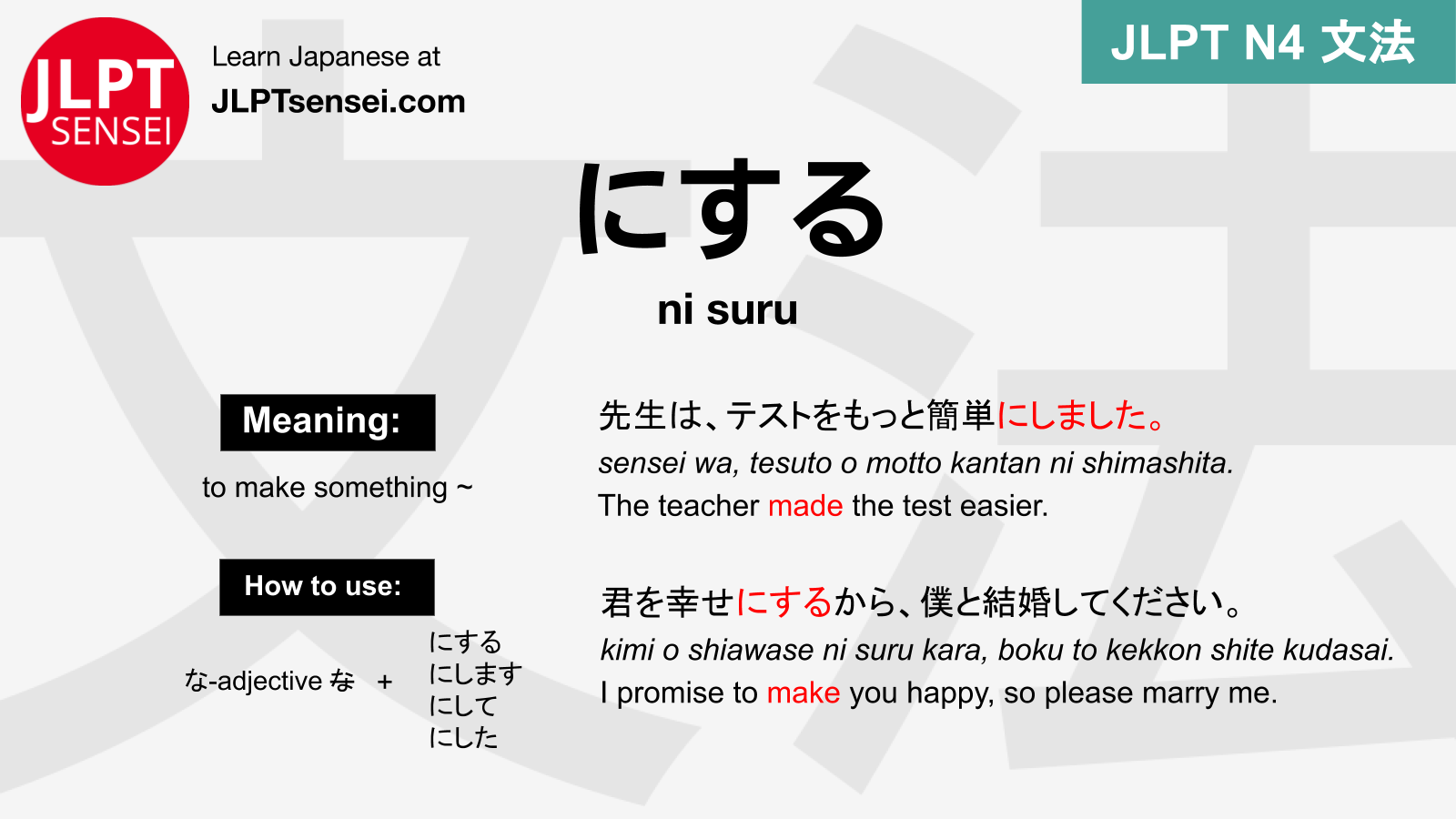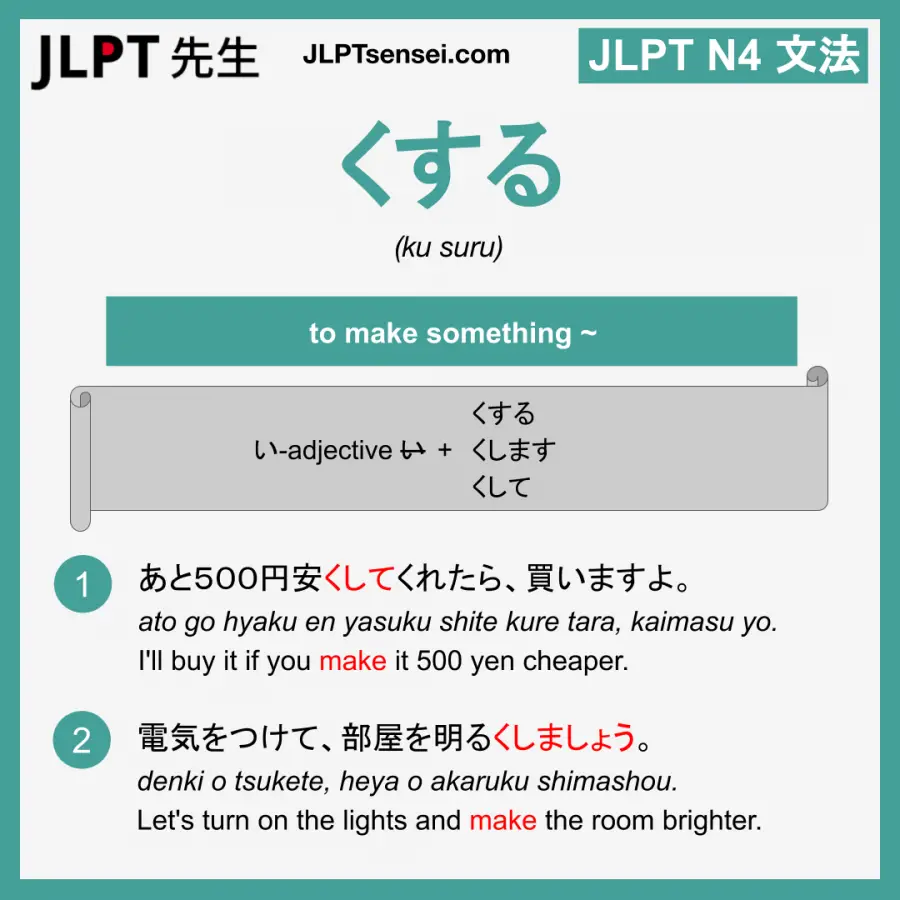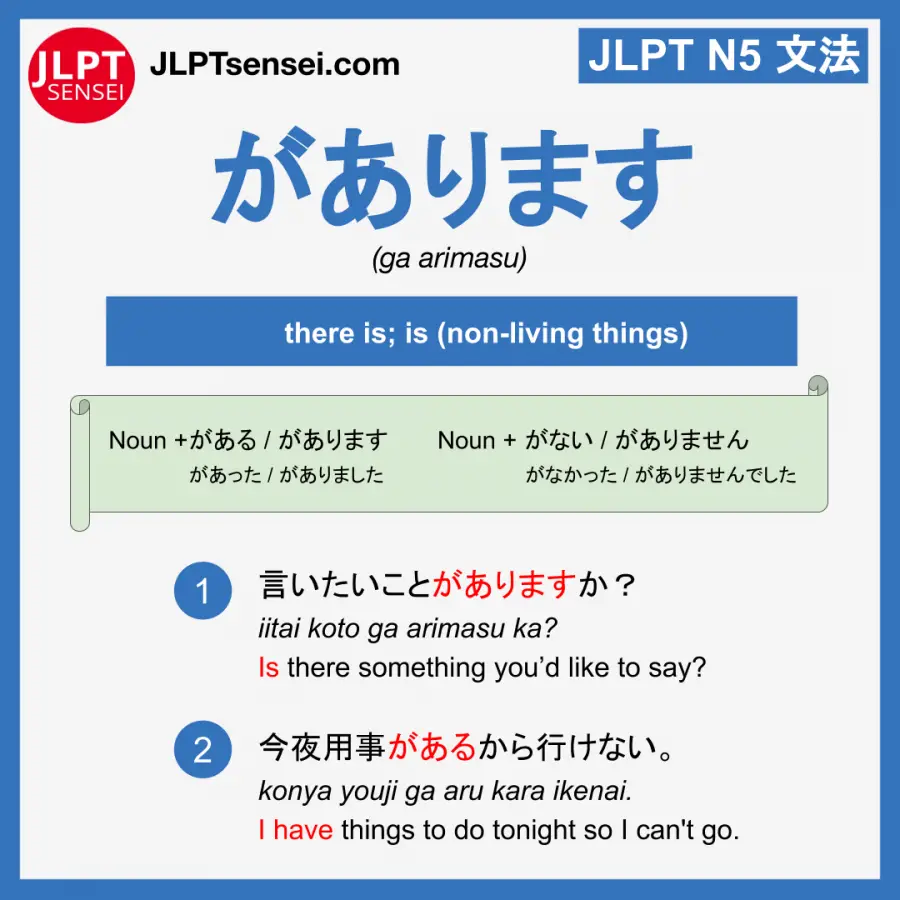
【イラスト&英語】「~すぎます」の文法説明 │ Langoal
c. やさしすぎます。. d. やさしもです。. The correct answer is c. This "too" means "excessively" so the expression " [verb/adjective stem] + すぎ" has to be used. やさしい is an いadjective, so its stem is やさし, not やさしい. Thus the choice a. has to be eliminated. If this "too" means "also (as.

KK(Bentuk Masu)/KS + sugimasu 「すぎます」 Belajar Bahasa Jepang Online
Grammar すぎます: Understanding the Verb Ending that Means "Too Much" Greetings, language enthusiasts! Today, we dive deep into the fascinating world of Japanese grammar. One key aspect of Japanese verb conjugation is the ending すぎます (sugimasu).

Example sentences using すぎます sugimasu Learn Basic Japanese, Basic
English Meaning (s) for すぎます. ichidan verb, intransitive verb. to pass through; to pass by; to go beyond. to pass (of time); to elapse. to have expired; to have ended; to be over. to exceed; to surpass; to be above. to be no more than. (as 〜に過ぎない, etc.) ichidan verb, intransitive verb, suffix.

JLPT N4 Grammar にする (ni suru) Meaning
たべます -> たべ ます + すぎる; たべ すぎて おなかが痛い (tabe sugite onaka ga itai) I ate too much and now my stomach hurts; Extra Notes: This grammar comes from the verb 過ぎる (sugiru), which means to pass or to exceed. However, this grammar most often written in just hiragana.

N3 Grammar ことにする (koto ni suru) Learn Japanese JLPT Sensei
すぎる (sugiru) Meaning: too much How to use the: Verb-ます stem + すぎる いadjective (remove い) + すぎる なadjective + すぎる Explain: Expression of exceeding the allowable limit of an behavior or a state. Therefore, the common sentence is often about bad things Example sentences: 1, 太郎、遊びすぎですよ。 Tarō, asobi-sugidesu yo. Taro, you 're playing too.

Learn JLPT N5 Grammar ある (aru)
V[ ます ]すぎます [い形容詞] い すぎます [な形容詞] な すぎます 日本語能力試験: N4 備考: ネガティブな気持ちの時、使うことが多い。 Used when you are feeling negative. 例文 飲み すぎました 。 I drank too much.

【文法1−2】みんなの日本語初級第44課 〜すぎます(形容詞) にほんご部
例文 〔V-ます〕+すぎる ちょっと、食たべすぎました。おなかが痛いたいです…。 東京とうきょうでお金かねを使つかいすぎました。もうお金かねがありませんよ。 子こどものころ、ゲームをしすぎましたから、私わたしは目めが悪わ.

ku suru くする くする jlpt n4 grammar meaning 文法 例文 learn japanese flashcards
例文. 1. 動詞文. 昨日は飲み すぎて 、何度も吐いちゃった。. I drank so much yesterday and I threw up several times. 最近、遊び すぎて 金欠なんです。. Recently, I've been hanging around out too much and I'm running out of money. 疲れ すぎて 、もう何もできません。. I'm too tired to do anything.

44課 A1 〜すぎます 日本語教師の応援サイトPart4
日本語教師のこうすけです😊今日も一緒に日本語を勉強しましょう!!~~~~~質問があったら、いつでもコメントしてください😊 オンライン.

Learn Japanese N4 Grammar With Flashcard Japanesetest4you Com www
すぎる is a verb that is used in Japanese to mean 'to exceed', or 'to go past'. It keeps this meaning when it is attached to other words, and creates the Japanese equivalent of saying that something is 'too much'. すぎる can be joined to the ます stem of verbs, the stem form of い-Adjectives (simply remove the い), or the stem form of な-Adjectives (simply remove the な).

N5 Grammar があります / がある (ga arimasu / ga aru) Learn Japanese JLPT Sensei
ビールを 飲 の みすぎました。 biiru o nomi-sugimashita. (I drank too much beer.) biiru o nomisugimashita あの 自転車 じてんしゃ の 値段 ねだん は 高 たか すぎました。 ano jitenshano nedan wa takasugi mashita. The price of that bicycle was too high. ano jitenshano nedan wa takasugi mashita. その 靴.

Learn JLPT N4 Grammar ようにする (you ni suru)
〜すぎ is the noun form of the verb 〜すぎる. In other words, 〜すぎ would be followed by です, and すぎる would become すぎます, in です・ます form. Sometimes these are interchangeable and it just depends if you want a noun or a verb, but in your example 言いすぎる on its own would not have the same meaning.

【N4文法】~すぎます・~すぎです YouTube
1. このズボンは長すぎます。 kono zubon wa nagasugimasu Meaning: This pair of trousers is too long.. 2. このシャツは大きすぎます。 kono shatsu wa ookisugimasu Meaning: This shirt is too big.. 3. この車は高すぎるから、買えません。 kono kuruma wa takasugiru kara, kaemasen Meaning: I cannot buy this car because it's too expensive.

Japan Grammar 20 Basic Japanese Verbs 20の基本的な日本語の動詞
日本の夏は暑すぎ [です・ます]。 The summer in Japan is too hot. Again, in this case, the meaning of the two versions is the same. Just keep in mind that the stem-form version 〜すぎです is often regarded as more informal and colloquial than the verb-conjugated version 〜すぎます.

N4 Grammar いこうけい / 思います / つもりです / よていです YouTube
Once you have found the stem of the verb or adjective, just add すぎる (sugiru) to the end. ★ For example, the stem of the verb 食べます (tabemasu) is 食べ (tabe).Add すぎる (sugiru) and it becomes 食べすぎる (tabesugiru) - eat too much. ★ The stem of the i-adjective 小さい (chiisai) is 小さ (chiisa). Add すぎる (sugiru) and it becomes 小さすぎる.

N3 Japanese Grammar られてしまう / 始める / かと思った YouTube
How and when すぎる is used. すぎる is used in Japanese to indicate that the degree of actions or states is excessive and it goes beyond the ordinary state of things. It is not always beneficial to overdo things, to exaggerate, so we find すぎる in sentences with a negative meaning or expressing undesirable states.